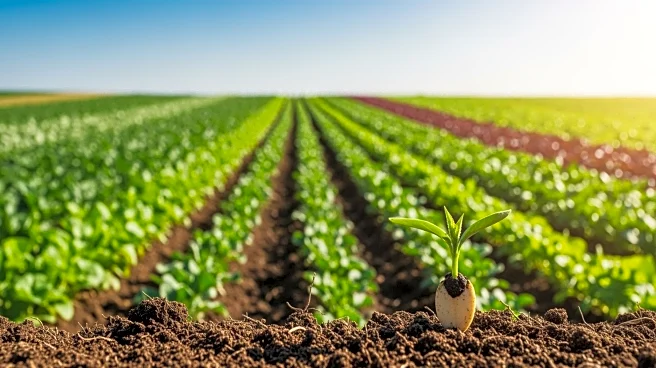What's Happening?
The Regenerative Agriculture Summit in São Paulo, Brazil, organized by Globo Rural, brought together over 200 participants, including farmers, agribusiness representatives, researchers, and policymakers.
The summit focused on Brazil's potential to scale up regenerative agriculture practices that promote long-term soil health and sustainable production. Kadigia Faccin, a professor at Fundação Dom Cabral, emphasized the cooperative approach needed for building a regenerative agriculture system, highlighting the challenges such as lack of technical guidance and financial support. The summit also discussed the ABC Plan, a public policy promoting low-carbon agriculture, and the need for a Harvest Plan that aligns with small farmers' needs.
Why It's Important?
Regenerative agriculture is crucial for sustainable food production and environmental conservation. Brazil, with its vast agricultural landscape, has the potential to lead in implementing practices that enhance soil health and reduce carbon emissions. The summit's focus on collaboration and policy alignment is significant for overcoming barriers faced by farmers, such as financial constraints and lack of reliable metrics. Successful implementation of regenerative practices could position Brazil as a global leader in sustainable agriculture, benefiting both the environment and the economy by meeting international demand for eco-friendly products.
What's Next?
The summit's discussions may lead to increased collaboration among stakeholders to address the challenges in adopting regenerative agriculture. Policymakers might consider revising existing agricultural plans to better support small farmers and enhance technical guidance. The potential for Brazil to scale up these practices could attract international partnerships and investments, particularly from countries seeking deforestation-free products. Continued dialogue and policy development are expected to follow, aiming to create a more supportive environment for sustainable agricultural practices.
Beyond the Headlines
The shift towards regenerative agriculture in Brazil could have long-term implications for global food security and climate change mitigation. By improving soil health and reducing carbon emissions, these practices contribute to environmental sustainability. Additionally, the cooperative approach advocated at the summit may foster stronger community ties and empower local farmers, leading to more resilient agricultural systems. The ethical dimension of promoting sustainable practices aligns with global efforts to combat climate change and protect biodiversity.










